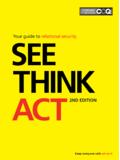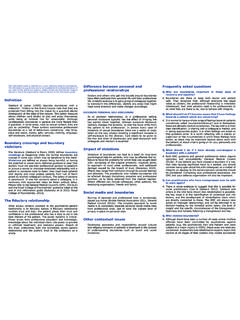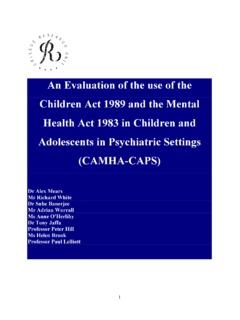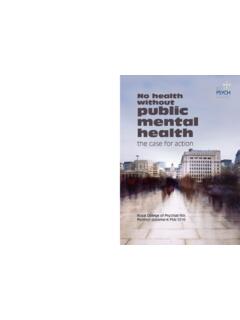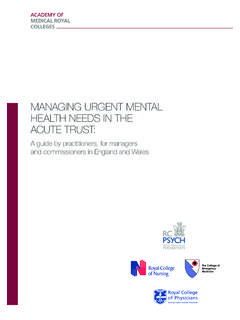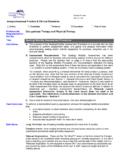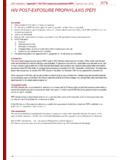Transcription of B n Health Services for Children and Adolescents …
1 There is and ever-increasing obligation on child and adolescent mental Developing mental Bernard & Turk Health Services to meet the needs of Children and young people with learning disabilities. This practical and concise book will help clinicians, Health Services for service managers and commissioners to rapidly develop the necessary skills and knowledge in this expanding area of clinical practice. It provides a comprehensive overview of epidemiology, mental Health disorders and their clinical presentations, multidisciplinary assessment and intervention, and mutli-agency working. It reviews the specific roles of different medical practitioners, such as clinical psychologists and occupational therapists. Plus there are sections on working in partnership Children and Adolescents with families, and service tiers and models.
2 With Learning Disabilities Developing mental Health Services for Children and Adolescents with Learning Disabilities About the editors Sarah Bernard is consultant psychiatrist for Children and Adolescents with learning disability at the Michael Rutter Centre, South London and Maudsley NHS Foundation Trust where she leads a tier 4 multidisciplinary national and specialist CAMHS-LD service. Her main clinical interests are the assessment and management of complex mental Health /behavioural problems associated with learning disability. She has a particular interest in rare developmental/genetic disorders, epilepsy, offending behaviour and parents with learning disability. She is also offers advice to the Retts Society, Prader-Willi Association and Unique. She is a member of the A toolkit for Clinicians examination subcommittee of the Royal College of Psychiatrists Jeremy Turk is Professor of Developmental Psychiatry at St.
3 George's, University of London, and Consultant Child & Adolescent Psychiatrist in the South West London & St. George's mental Health NHS Trust where he is Clinical Team Leader on the Child & Adolescent mental Health Learning Disability Service. His main clinical and academic interests and expertise relate to the mental Health issues experienced by Children and youg people with intellectual disability. He is also Consultant Psychiatrist to the National Autistic Society and Council Member of the Royal Society of Medicine Intellectual Disability Forum. With a foreword by Dawn Rees, National CAMHS Strategic Relationships and Programme Manager at the National CAMHS Support Service. Edited by Dr Sarah Bernard PUBLICATIONS & Professor Jeremy Turk Developing mental Health Services for Children and Adolescents with Learning Disabilities A toolkit for Clinicians Developing mental Health Services for Children and Adolescents with Learning Disabilities A toolkit for Clinicians Edited by Dr Sarah Bernard & Professor Jeremy Turk RCPsych Publications in collaboration with the National CAMHS Support Service The Royal College of Psychiatrists 2009.
4 RCPsych Publications is an imprint of the Royal College of Psychiatrists, 17 Belgrave Square, London SW1X 8PG. All rights reserved. No part of this book may be reprinted or reproduced or utilised in any form or by any electronic, mechanical, or other means, now known or hereafter invented, including photocopying and recording, or in any information storage or retrieval system, without permission in writing from the publishers. British Library Cataloguing-in-Publication Data. A catalogue record for this book is available from the British Library. ISBN 978-1-904671-61-9. Distributed in North America by Balogh International Inc. The views presented in this book do not necessarily reflect those of the Royal College of Psychiatrists, and the publishers are not responsible for any error of omission or fact.
5 The Royal College of Psychiatrists is a charity registered in England and Wales (228636) and in Scotland (SC038369). Printed UK by Bell & Bain Limited, Glasgow. Contents List of contributors vi Foreword vii Preface ix List of abbreviations x 1 Epidemiological overview 1. 2 Multidisciplinary mental Health assessment 7. 3 Clinical psychology 20. 4 Speech and language therapy 28. 5 Occupational therapy 33. 6 Nursing 37. 7 The social work contribution 39. 8 Medical 42. 9 Multi-agency working 49. 10 Working in partnership with families 53. 11 Service tiers and models 55. Index 56. v Contributors Tamsin Arnold, DClinPsy, Consultant Clinical Psychologist, The Children with Disabilities Behaviour and Family Support Team, Royal Borough of Kensington and Chelsea/Central and North West London NHS.
6 Foundation Trust, London Sarah H. Bernard, MD FRCP sych DRCOG, Consultant Psychiatrist, Child and Adolescent Learning Disability, South London and Maudsley NHS. Foundation Trust, London Vivienne Cooper, Parent and Trustee of the Challenging Behaviour Foundation Alison Dunkerley, MB ChB MRCP sych, Consultant Learning Disability Child Psychiatrist, 5 Boroughs Partnership NHS Trust, St Helens, Lancashire Dido Green, PhD MSc DipCOT, Clinical Expert Occupational Therapist, Paediatric Neurosciences, Guy's Hospital, London Felicity Hepper, MRCP sych, Consultant Child and Adolescent Psychiatrist, Brent Child and Adolescent mental Health Service, Central and North West London NHS Foundation Trust, London Jen Jenkin, MRCSLT, Principal Speech and Language Therapist, Northumber . land, Tyne and Wear NHS Trust Tony O'Sullivan, FRCP FRCPCH DCH, Consultant Paediatrician and Clinical Director, Kaleidoscope Lewisham Centre for Children and Young People, Lewisham Primary Care Trust David Smith, MSc BSc(Hons) RMN RNMH, Clinical Nurse Specialist, Wandsworth Child and Adolescent mental Health Learning Disability Service, South West London and St George's mental Health NHS Trust Helen Stringer, PhD MRCSLT, Director of Clinical Education/Speech and Language Therapist, School of Education, Communication and Language Sciences, Newcastle University Harry Tuck, Social Worker, Project Manager, Lambeth Children and Young People's Service Jeremy Turk, MD BSc(Hons)
7 FRCP sych FRCPCH DCH, Professor of Developmental Psychiatry, St George's, University of London, and Consultant Child and Adolescent Psychiatrist, South West London &. St George's mental Health NHS Trust vi Foreword We are delighted to welcome you to this practical toolkit , which, in its brief and easy-to-read format, outlines the key principles to consider when working with Children and young people with a learning disability who have a mental Health problem. The National Service Framework for Children is now in its fifth year and the Public Service Agreement 12 (2007), as part of the Comprehensive Spending Review, set out the government's vision for improving the physical, mental and emotional Health of all Children and re-emphasised the needs of Children and young people with a learning disability.
8 While we recognise that much progress has already been made in this field, we also know there is still a need to embed quality commissioning and provider Services for all Children and young people and in particular for those who have learning disabilities, in order that they have access to truly comprehensive child and adolescent mental Health Services which meet all their needs. This toolkit is written by clinicians for clinicians. It emphasises the clinical, practical and theoretical perspectives which will help build a more capable workforce and deliver Services that improve the life chances of this group of Children . It is a further contribution to the range of toolkits and resources which champion the needs of this group of Children , such as the Do Once and Share' project and its care pathway, and which have been helpful in developing our thinking about what kind of support and developments ensure that appropriate levels of service are commissioned and provided.
9 This toolkit adds to that body of work and extends it. This toolkit is an aide-m moire for mental Health professionals when starting out in clinical practice. It aims to support their work with Children and young people with learning disabilities and covers the topic areas which are relevant to most cases. No handbook, however, can be exhaustive, so the reader will find references for further reading at the end of each chapter. Skills build over time as experience expands, and we hope that this publication will be a useful contribution to professional development for all staff working with this group of young people. vii mental Health Services and intellectual Disabilities Respected clinicians and practitioners voluntarily contributed their experi . ence to each of the chapters.
10 Our thanks go to them. Our particular thanks go to the clinical editors, Dr Sarah Bernard and Professor Jeremy Turk, who edited the contributors' drafts and organised the material into a coherent whole. It is typical of their unstinting commitment to improving the lives of this group of Children and young people that they never turn down an opportunity to make a difference! Dawn Rees National CAMHS Strategic Relationships and Programme Manager. National CAMHS Support Service viii Preface It is widely recognised that although young people with learning disability are at an increased risk of mental Health or behavioural problems, there is a serious lack of appropriate mental Health provision to meet these needs. The National Service Framework for Children states clearly that Services should be available to all.

